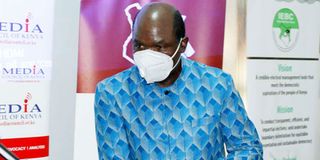Political parties cornered on enactment of gender rule

IEBC Chairman Wafula Chebukati speaks during a media sector working group meeting in Mombasa on August 9, 2021. he said the commission will comply with the court orders on two-thirds gender rule.
What you need to know:
- Former chairperson NGEC and advocate of the High Court Winfred Lichuma says the 2017 High Court ruling on adherence to the respective provision is binding to political parties.
- Ms Lichuma says the judgment is valid as it has not been challenged since it was made in April 2017, and failure to execute it would imply “the courts exist in a vacuum”.
Political parties will have no choice but to comply with the two-thirds gender principle when nominating candidates for parliamentary and senatorial elections.
Former chairperson National Gender and Equality Commission and advocate of the High Court Winfred Lichuma said the 2017 High Court ruling on adherence to the respective provision is binding to political parties.
“You cannot deny a constitutional right to a group when the court has clearly interpreted and provided for it,” she told nation.africa by phone on Tuesday.
“So IEBC (Independent Electoral and Boundaries Commission) would be violating the court if they decided they were not complying with the court order,” she added.
She said the judgment is valid as it has not been challenged since it was made in April 2017 and failure to execute it would imply “the courts exist in a vacuum”.

Former National Gender and Equality Chairperson Winnie Lichuma says political parties have no choice but to comply with the two-thirds gender principle.
In making the ruling on the Katiba Institute’s constitutional petition against IEBC, judge Chacha Mwita directed the latter to “reject any nomination list of a political party for its candidates for the 290 constituency-based elective positions for members of national Assembly and 47 county-based positions for the member of the Senate that do not comply with two-thirds gender rule.”
Six months
He also ordered political parties to take measures to formulate rules and regulations purposed to actualise the two-thirds gender principle during nominations for the Members of Parliament(MP) and Senate candidates within six months from the day of the judgement(April 20).
The IEBC was at the same time obligated to devise an administrative mechanism to ensure the two-thirds gender principle is realised among political parties during nomination exercises for parliamentary elections
Speaking on Monday during a local television interview, Garissa Township MP Aden Duale, argued that the ruling is not binding to the political parties owing to a lack of legislative backing.
“Minus an existing law… which is not there now, the ruling is not binding to the political parties,” he said.
Ms Lichuma, however clarified the High Court ruling as a judge-made law – one developed from judgments handed down in court and therefore, is binding.
During a Kenya Media Sector Working Group meeting in Mombasa on Monday, IEBC chairperson Wafula Chebukati said the commission will comply with the court orders.
“This provision (two-thirds gender principle) has been attained in the County Assemblies by way of gender top-up through the party list model,” he said.
“However, the realisation of the two-thirds gender rule has remained elusive in Parliament with several unsuccessful attempts at providing legislation to operationalise the principle,” he noted.
Gender principle
Mr Chebukati said the commission will hold a meeting with the Political Parties Liaison Committee (PPLC) to discuss compliance with the orders. PPLCs are established at the national and county levels and provide a platform for dialogue between the Registrar of Political Parties, IEBC and political parties.
It is a decade now, since the new Constitution became live in Kenya and the country is yet to have a law on achievement of two-thirds gender principle in elective and appointive positions as provided in Article 27(8).
Extended period
In 2012, the Supreme Court gave Parliament till August 27, 2015, to pass a law effecting the principle lest it be dissolved. Parliament extended the period to August 27, 2016. The deadline elapsed and nothing happened.
Later, the Centre for Rights, Education and Awareness (Creaw) and the National Women Steering Committee sued the National Assembly and Senate in the High Court for failing to enact the law.
In March 2017, the Court ordered the two houses to pass the gender principle law within 60 days. They defaulted.
Again, Mr Duale’s Constitution of Kenya (Amendment) (No 4) Bill, 2015 (Duale Bill) could not pass due to lack of quorum. It was shelved in February, 2019, after a fourth failed attempt.
Last year, retired Chief Justice David Maraga advised the President to dissolve Parliament for failing to enact a law to actualise the gender principle. This advisory, however, attracted a flurry of petitions whose determination is yet to be made.





